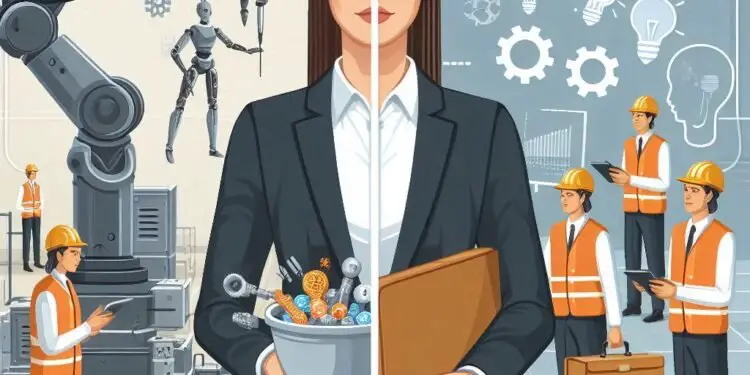Introduction
AI and jobs are on the center of a worldwide transformation. Artificial Intelligence (AI) is now not only a futuristic buzzword — it’s reshaping industries, redefining workflows, and transforming the task marketplace. From healthcare and finance to logistics and customer service, AI is becoming a key motive force of productivity and selection-making. But what does this imply for you as a employee?
Will AI take your hobby? Or will it create new opportunities? Should you worry it, include it, or discover ways to paintings along it?
In this article, we’ll smash down how AI is changing the arena of exertions, what talents have become important, which jobs are at danger (and that are safe), and the way to future-proof your profession within the age of automation.
What Is AI and Why Does It Matter?
Artificial Intelligence (AI) refers to machines and software systems that can mimic human intelligence — including studying, reasoning, trouble-fixing, and decision-making.
Examples of AI in movement encompass:
- Chatbots like ChatGPT
- Recommendation algorithms on Netflix or Amazon
- Facial reputation structures
- AI-powered fraud detection
- Autonomous vehicles and drones
AI topics due to the fact it could automate repetitive obligations, examine massive datasets brief, or even carry out modern or strategic abilties — which has direct implications on jobs, wages, and the way organizations function.
How AI Is Reshaping the Job Market
AI isn’t most effective a technological improve — it’s an economic stress this is:
🔄 1. Automating Routine Work
Jobs associated with repetitive, predictable obligations are the primary to be automated.
Examples of impacted roles:
- Data entry clerks
- Bank tellers
- Cashiers
- Call middle sellers
- Basic administrative assistants
AI can do these tasks quicker, much less high priced, and without fatigue — decreasing the call for for human employees in such roles.
2. Enhancing Skilled Jobs
AI is also getting used as a tool to help — now not update — professionals.
Examples:
- Doctors the usage of AI to locate ailments in scientific images
- Lawyers the usage of AI to experiment crook files
- Marketers the use of AI for advertising campaign optimization
- Journalists the usage of AI to generate first drafts or have a look at property
These personnel grow to be greater efficient and accurate, boosting fee instead of being changed.
3. Creating New Roles
Just similar to the Internet created net developers and social media managers, AI is growing absolutely new jobs.
Emerging procedure titles:
- AI teacher
- Prompt engineer
- Machine gaining knowledge of engineer
- Data ethicist
- Automation representative
Many of these roles didn’t exist 5–10 years in the past. This style will maintain as era evolves.
Which Jobs Are Most at Risk from AI?
According to studies from McKinsey and the World Economic Forum, jobs most prone to AI automation are:
| Risk Level | Job Types |
|---|---|
| High | Telemarketers, data entry, drivers |
| Medium | Accountants, paralegals, radiologists |
| Low | Teachers, psychologists, electricians |
Jobs associated with manual dexterity, creative questioning, or human interaction are tons much less in all likelihood to be absolutely changed.
Which Jobs Are Safe — and Even Growing?
AI can also take away some roles, however it additionally boosts demand in other areas. Here’s wherein possibilities are increasing:
✅ 1. Technology & AI Development
- AI engineers, facts scientists, software program program builders
- Robotics experts, cloud engineers, cybersecurity specialists
✅ 2. Healthcare and Human Services
- Nurses, therapists, social workers, caregivers
✅ 3. Skilled Trades
- Electricians, plumbers, HVAC technicians
- These require bodily presence and complicated real-global hassle solving
✅ 4. Creative & Strategic Fields
- Designers, writers, marketing and advertising and marketing strategists, entrepreneurs
- AI can decorate innovative workflows but not often replaces the middle human instinct concerned.
How AI Is Changing the Skills You Need
To remain aggressive in the evolving manner marketplace, employees need to develop new talents and adapt vintage ones.
Top Future-Proof Skills:
1 Digital Literacy
- Understanding simple software software device, structures, and cloud offerings.
2. Data Analysis
- Making enjoy of statistics, analyzing dashboards, using AI gear for insights.
3 Critical Thinking
- The ability to impeach, examine, and make judgments beyond what AI can infer.
4 Emotional Intelligence
Empathy, management, and communique stay irreplaceable in maximum human-centered jobs.
5. Lifelong Learning
- The capability to continuously upskill and adapt to new gear and technology.
Simple Real-World Examples of AI at Work
📦 Example 1: Amazon Warehouses
Robots contend with storage and sorting, however human beings nevertheless supervise structures, take care of quality manipulate, and remedy logistical issues.
�⚕️Example 2: Hospitals Using AI Scans
AI scans X-rays, however human medical docs make very last diagnoses and manipulate affected person communication.
Example 3: Video Editors Using AI Tools
AI automates subtitles and color grading, however storytelling and ingenious imaginative and prescient come from the editor.
What Workers Can Do to Prepare
Rather than fearing AI, the smart circulate is to comply and prepare. Here’s how:
✅ 1. Upskill with Online Learning
Use platforms like Coursera, LinkedIn Learning, or Udemy to investigate:
- Data capabilities
- AI basics
- Digital advertising
- Project control
✅ 2. Use AI as a Personal Assistant
- Let AI assist you write, set up, studies, or brainstorm — no longer update you, however enhance your efficiency.
✅ 3. Follow Industry Trends
Stay updated with gadget like:
- World Economic Forum Reports
- MIT Technology Review
- Harvard Business Review
✅ 4. Network and Reskill
- Join professional businesses, attend webinars, and adapt your profession course primarily based on wherein your industry is heading.
AI and Remote Work: A Winning Combination
AI is making some distance off paintings extra green and attractive. Tools like:
- AI-powered transcription
- Smart scheduling assistants
- Language translation
- Workflow automation (Zapier, Notion AI)
These tools assist a ways off groups collaborate effectively, increasing process pleasure and decreasing location dependency.
The Role of Governments and Companies
Governments and employers have a shared responsibility to govern the effect of AI:
Governments need to:
- Invest in digital infrastructure
- Support retraining programs
- Offer social protection nets for displaced humans
Companies should:
- Offer on-the-process schooling
- Support ethical AI use
- Promote inclusive hiring and re-skilling
Conclusion
AI is not the stop of work — it’s the evolution of hard work. While some roles may disappear, others will broaden, and totally new ones will emerge. The key is to live adaptable, keep learning, and use AI as a tool, now not a danger.
As a worker, the destiny belongs to folks who combine technology with human talents: empathy, creativity, control, and flexibility. Embracing AI well can lead not to task loss, however to career growth.
Key Takeaways:
- AI is automating habitual jobs however moreover growing new ones.
- Skills like data literacy, emotional intelligence, and essential questioning are important.
- The destiny technique market will pick those who can work with AI — no longer in the direction of it.
- Proactive learning and version are the splendid defenses against hobby disruption.













